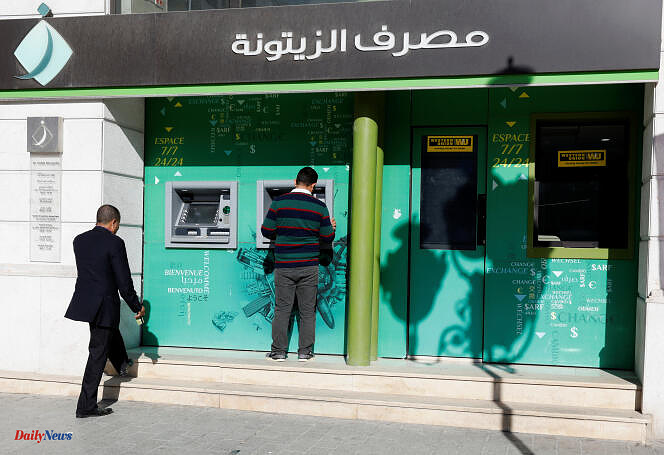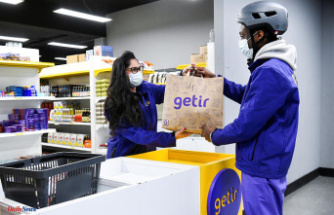For almost four years, Olfa has lived cloistered at home. Sentenced in absentia to thirty-five years in prison for bad checks, this 45-year-old divorced mother from Radès, in the southern suburbs of Tunis, is still wanted by the authorities. “If I didn't have faith, I would have committed suicide,” confides this former business leader who went bankrupt following the Covid-19 crisis and is only waiting for one thing: the reform of legislation – particularly severe in Tunisia – on bad checks, as President Kaïs Saïed promised in March 2023.
Today, article 411 of the Commercial Code provides for five years in prison per rejected check – the penalties being cumulative – and a fine of 40% of the amount of these checks. This law, deemed disproportionate, “does not allow the creditor to recover his dues, nor the convicted person to regularize his situation since he is behind bars,” the Tunisian president raised. Official figures released at the end of 2022 show an alarming situation: more than 7,000 people are believed to be detained for issuing bad checks – or a third of the prison population – and more than 450,000 people are wanted.
If these figures were downplayed by the Ministry of Justice, which counted less than 500 detainees and 10,000 ongoing cases in November 2023, the Central Bank of Tunisia recorded more than 400,000 rejected checks, totaling 3.5 billion dinars (around 1 billion euros), for the year 2023 alone. “There is an accounting problem at the ministry,” criticizes Abderrazak Houas, spokesperson for the National Association of Small and Medium Enterprises (ANPME) .
“I’m like I’m in prison.”
Friday April 12, a bill aimed at “decriminalizing certain offenses linked to bad checks and reducing certain sanctions, in particular those resulting in custodial sentences,” was presented by the Minister of Justice in the Council of Ministers, according to the presidency of the government, which does not indicate in which cases prison sentences could be reduced or abolished.
The project must still be subject to modifications before being definitively validated by the government and then transmitted to Parliament – but no deadline has been communicated. At the same time, 84 deputies called for the urgent examination of a bill tabled in February with the aim of decreeing a general amnesty affecting people who have issued bad checks.
For the hundreds of thousands of Tunisians who use checks as a means of deferred payment or guarantee, the trap can close suddenly. In 2017, Olfa opened a small textile factory for export in La Goulette, a suburb of Tunis, employing around fifty employees and working for European ready-to-wear brands.
For her equipment, she had to go to a supplier who accepted installment payments by check, a common practice among entrepreneurs faced with the reluctance of banks to grant credit. “They are forced to do this with their suppliers or go through intermediaries who act as shadow banks. They are real mafias,” confirms Abderrazak Houas.
Despite some difficulties, the business prospers and Olfa manages to honor its financial commitments without too much difficulty. But the year 2020 marks a turning point: the outbreak of Covid-19 and the announcement of general confinement on March 22 forced it to suspend its activities. The following month, his supplier cashed several checks, all rejected by the bank despite a government decree calling on financial institutions to show leniency. “He cashed the checks before time, despite the agreement we had reached, simply because he was afraid,” regrets Olfa.
In a few months, the mother found herself destitute. She was finally sentenced in 2021. “I’m like in prison. I couldn’t even attend my daughter’s graduation, who was also very affected psychologically,” she confides.
“I’ll never come back.”
Between 2019 and 2021, according to the National Institute of Statistics, 75,000 companies went out of business, or nearly 10% of registered companies. For Abderrazak Houas, this figure, although significant, does not reflect the “catastrophic” reality of the economic situation of Tunisian SMEs. The ANPME spokesperson estimates that 125,000 additional companies have ceased their activities since the Covid-19 crisis.
2,000 km away, in Rabat (Morocco), Haythem experienced the same misfortune as Olfa. “Here there is a café always full of Tunisians that we call “the check café”, he quips. After using parallel market financing networks for more than ten years, he saw his business collapse in 2020 during the Covid-19 crisis. “These people spare no one, they cashed all the checks. » Bankrupt and over-indebted, he was arrested in December 2021 at his home. Released four months later while awaiting his trial, he decided to flee to Morocco, before being sentenced to ninety-three years in prison.
According to ANPME, more than 10,000 Tunisians prosecuted for issuing bad checks have, like Haythem, left the country. Married and father of three children, this exiled entrepreneur now lives alone, supported by his friends and acquaintances. With his brother, imprisoned in Tunisia, and his parents, themselves wanted, he hopes for an amnesty for his family and, for his part, to be able to work again, elsewhere than in Tunisia. “I’ll never go back there,” he said. This country destroyed me. »












